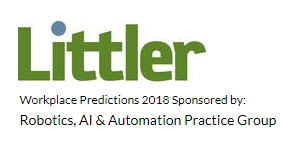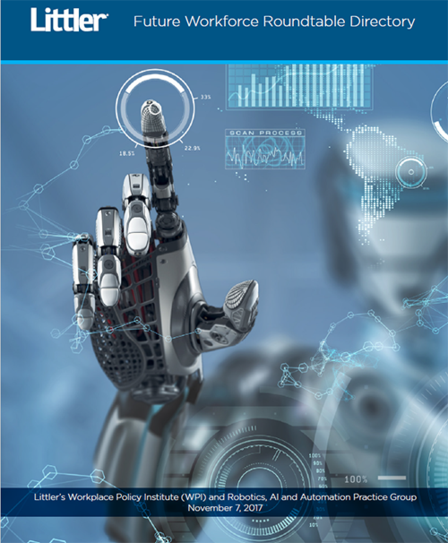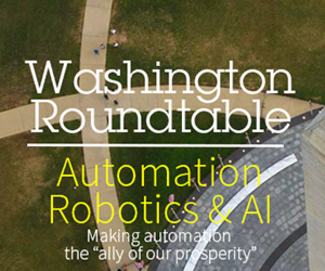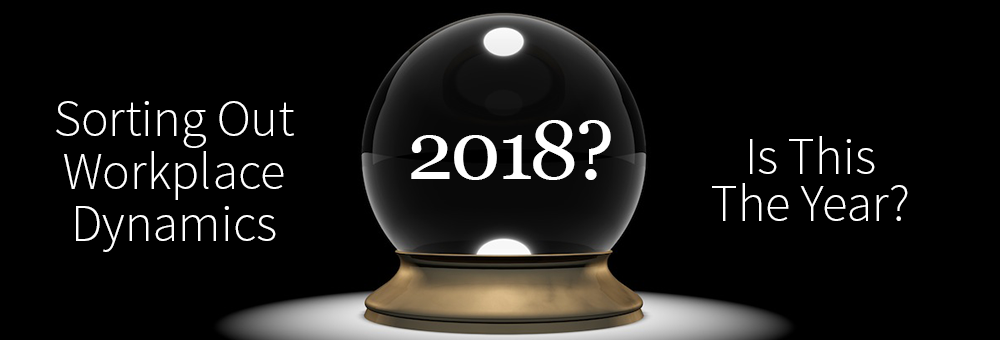
Predictors, Predictions & Portents: The Workplace 2018
Robots, automation & AI: Lot more than work in the workplace this year
It’s that time of year again for resolutions, predictions, and great expectations.
Sorting out workplace dynamics
Is this the year that we get some clarity about the disruptions going on in the workplace…what they portend, and what to do about them…or with them?
Automation, robots and artificial intelligence (AI) have been converging on desktops and in factory work cells just about everywhere for some time now. In the process, what it means to have a job, to work, to be an employee, to be a teammate with other employees, to have a career…as well as to feel wanted, needed, and to have a sense of well-being about the future…are changing fast, and profoundly so.
The changes are coming fast and furious, and are enough to make most any employee’s head spin with uncertainty and trepidation. However, are we getting any sense that the changes are equally good and beneficial for employer and worker alike, that change-fatigue is ebbing, and that workers are learning how to accommodate for transformation and gird themselves for ever more disruption?
From help wanted ads to exit interviews, the workplace is suddenly a brave new world of jobs in flux where daily 3 billion of our global brethren find themselves pioneering what it means to work.
Taking a look ahead?
So, what’s on tap for the workplace in 2018? What are the experts predicting for these millions of worldwide workplaces were billions of work pioneers pile into every day (or maybe not every day, or maybe not piling into, but out of)?
Three good reads for 2018 go a long way at offering insights on work and the workplace:
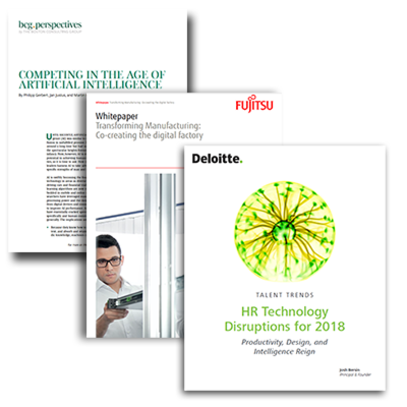
Boston Consulting Group: Competing in the Age of Artificial Intelligence
Fujitsu: Transforming Manufacturing: Co-creating the Digital Factory
The AI-focused company
Boston Consulting Group: Competing in the Age of Artificial Intelligence is a good place to begin. It offers up an insightful look at the drivers of much of workplace change for 2018, which is—as we have a come to expect—artificial intelligence in its many flavors and forms.
For a worker’s job security, career potential, and an ample portion of peace of mind, a good grounding in what an AI-focused company (the employer) is facing will be essential.
BTW: An AI-focused company has nothing to do with size; even the candy shop on the corner will be beholden to data and analytics.
The common formula for success in Competing in the Age of Artificial Intelligence:
“Winning strategies put a premium on agility, flexible employment, and continual training and education. AI-focused companies rarely have an army of traditional employees on their payroll. Open innovation and contracting agreements proliferate. As the chief operating officer of an innovative mobile bank admitted, his biggest struggle was to transform members of his leadership team into skilled managers of both people and robots.”
Imagine, “skilled managers of both people and robots”. Give it a shot. It’s a good read.
The HR tool belt
Then there’s Josh Bersin in his Deloitte (Bersin-Deloitte Consulting): HR Technology Disruptions for 2018: Productivity, Design, and Intelligence Reign
“Companies spend billions each year on recruiting and it has become an escalating war for employment brand, candidates, candidate experience, and strategic sourcing.”
Bersin ticks off a few major trends to impact HR in 2018:
- High volume recruitment (hospitality, services, healthcare, retail) is being automated by chatbots and other new tools; skilled job recruitment is being revolutionized by open sourcing tools, more automated applicant tracking systems (now called recruitment management systems), and better assessments. And video assessment and culture assessment tools have matured so far that everyone can use them.
- Every major company has to buy a whole tapestry of tools to compete.
- I liken the recruitment technology market to the problem builders face in construction. You need an entire toolset of world-class machines to do the job, and each one has its own learning curve to use well…all the new technologies are making recruiters smarter about candidates, just as candidates are getting smarter about your companies.
- Remember also that the old fashioned “job description” is really going the way of the dinosaur. More and more jobs are “hybrid” and rapidly changing, so the new world of tools has to help us find people with the right capabilities and learning skills, not just technical or cognitive abilities. And diversity is now a core part of recruiting, with new technology to help remove bias from job descriptions and reduce bias in interviewing (even VR can help with this).”
Bonus Reads:
Fujitsu’s Steven Cox: Predictions 2018: where technology and AI intersect with workplace inclusion
HR Technology Disruptions for 2018 (Bersin-Deloitte Infograph)
Factory future
Fujitsu Transforming Manufacturing: Co-creating the Digital Factory
Fujitsu, a Japanese company, has elected to build a Factory of the Future in Germany (Augsburg). That in and of itself is interesting…and smart.
“The future of manufacturing is digital, and it’s real. It can be delivered by the people who have a proven track record in doing just that: turning theory into practice and overcoming the challenges that face manufacturers all over the world,” so says Fujitsu.
Fijutsu’s white paper, Transforming Manufacturing: Co-creating the Digital Factory, is a well-written, well-researched look at work and workers in this smart factory in Augsburg “turning theory into practice”.
Fujitsu’s Steven Cox has a few eye-opening predictions for 2018 about Fujitsu employees…and the rest of us:
- Ethics engines will be developed that rather than seeking to make decisions for or on behalf of human beings will actually review their business decisions and where necessary challenge them in the context of adherence to corporate values.
- We will see the first job descriptions emerging that include where automation or AI may be introduced in the future. Almost like “AI job descriptions” whereby a company describes a job to be done as if it were a human role profile, but is actually for bots.
- We will see formal complaints from employees or job applicants that they have been discriminated against due to the use of technology in making people-based decisions in the workplace. Corporates will have to consider updating their policies and procedures accordingly
- The first cases of employees using machine learning or artificial intelligence to perform parts of their own jobs, without necessarily telling their employers that they are doing so, will emerge.
- There will be increasing political pressure on businesses to publish open standards for how these technologies are being used in making people-based decisions, especially where it has implications for macro-economic factors such as employment rates of women, mature workers and so on.
- Recruitment consultants will offer services to job candidates that specifically assist them to position their CVs, online presence, and job applications in a way that optimizes their prospects through AI recruitment engines that will likely be analyzing such data
- Corporates will offer staff “wellbeing and productivity bots” that monitor staff work patterns and seek to offer improvement recommendations.
That’s a lot! If these predictions hold true, the workplace for 2018 will continue its inexorable trek to digital transformation, but, as the experts amply display in their predictions, we’re getting better at understanding and effectively dealing with these momentous changes.
In November of 2017, the Littler Washington Roundtable brought together forty global experts to brainstorm and provide counsel on the digital transformation of the workplace. Here’s a briefing on the directions taken by the members of that Littler Washington Roundtable: Workplace Transformation and the Reinvention of Work
A full report on the results of that meeting will be forthcoming in 2018.

